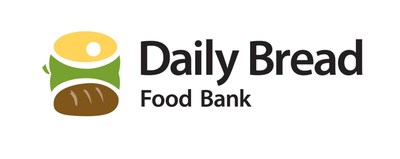Daily Bread Food Bank Study Reveals Food Insecurity and Food Bank Use on the Rise During COVID-19 Despite Government Relief
Future challenges include heightened physical and mental health risks, eviction and risk of homelessness
TORONTO, July 29, 2020 /CNW/ - Daily Bread Food Bank has released a comprehensive report detailing the impact of COVID-19 on food insecurity and food bank use in Toronto. The only report of its kind in Canada, Hunger Lives Here: Risks and Challenges Faced by Food Bank Clients During COVID-19, reveals a 200 per cent increase in new clients accessing food banks in Toronto during the pandemic.

Based on a survey of 220 food bank clients during May and June 2020, the report illustrates the heightened health risks and challenges faced by food bank clients. It is also a predictor of a new wave of issues that will erupt if Canada's social safety net does not evolve.
Key findings from the report include:
- 76 per cent of new clients began accessing food banks due to COVID-19, primarily because of job loss or a reduction in hours.
- 32 per cent of respondents had at least one household member working pre-pandemic, and 76 per cent of these households reported job loss.
- Due to income loses, the proportion of respondents spending 50 per cent or more of their income on housing rose from 67 per cent pre-COVID-19 to 81per cent during the pandemic, putting these households at high risk of homelessness.
- 34 per cent of respondents will be unable to continue to pay rent four to six months from now if the crisis continues.
- 28 per cent of respondents received the Canada Emergency Response Benefit (CERB), however, due to the high cost of living in Toronto, still needed to rely on food banks.
- The frequency of going a full day without eating almost every month increased 20 per cent.
- Before COVID-19, one in four children went hungry according to their parents. This number has increased to one in three during the pandemic.
More than half of food bank clients are considered high-risk for severe illness from COVID-19 due to age and/or pre-existing health conditions, almost double the rate of the Canadian population. In addition, the number of respondents moderately or severely stressed about having enough to feed their household has tripled during the pandemic.
"Once a household falls into persistent poverty, it becomes increasingly difficult to achieve financial stability," says Neil Hetherington, CEO, Daily Bread Food Bank. "Much of Toronto's population was already struggling financially before the pandemic. With food bank clients unable to pay rent four to six months from now, there is a major risk of a tidal wave of arrears and evictions in our city."
"This report reveals the extraordinary vulnerability of the people seeking charitable food assistance through this pandemic," says Valerie Tarasuk, Professor, Department of Nutritional Sciences, University of Toronto. "While Daily Bread Food Bank and partner agencies have worked hard to respond to growing demands during this challenging time, the needs of the people they are helping go beyond charitable food assistance."
The economic impact of COVID-19 will be experienced for years to come. As the government's state of emergency ends, thousands of Toronto residents will remain in emergency situations and continue to require supports. More than ever, investments in healthy communities are essential.
Hunger Lives Here: Risks and Challenges Faced by Food Bank Clients During COVID-19 provides concrete recommendations for all levels of government to prioritize poverty reduction in economic recovery.
To read full report and recommendations, visit dailybread.ca/hungerliveshere
SOURCE Daily Bread Food Bank
